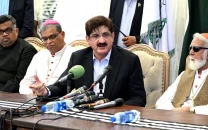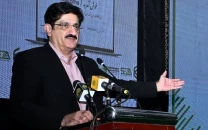Is public-private partnership the answer when the stakes are high?
Seminar organised on technical vocational education and training looks at different aspects.

"If we allow the private sector to completely run the show, then there is always the possibility that we are giving way to a dog-eat-dog society," Sindh Technical Education Minister Sadiq Ali Memon. CREATIVE COMMONS
This was the topic of discussion at a seminar, Public-Private Partnership in TVET, organised by the Sindh Technical Education and Vocational Training Authority and Punjab Vocational Training Council on Wednesday. The event was held in collaboration with the TVET Reform Support Programme of the Deutsche Gesellschaft für Internationale Zusammenarbeit (German Agency for International Cooperation or GIZ), which is co-financed by the European Union, German and Dutch governments.
“Employers are not satisfied with the quality of training as students lack the practical skills required by the industry,” said GIZ Coordinator Dr Ute Hoffmann. “Only 31 per cent of the youth and families accept technical vocational education and training for professional development after matriculation.”
According to Dr Hoffmann, the reform support programme was initiated in Pakistan for apprenticeships of students in industries and labour market so that more employment opportunities could be created.
The programme has been divided into four components - awareness about the TVET system in Pakistan, apprenticeship of the diploma-holders in industries, innovative training delivery as well as labour market information, and capacity building for the education and training systems.

Sindh Technical Education Minister Sadiq Ali Memon, the chief guest at the seminar, pointed out the mistrust between public and private sectors. “We all need to cut through the mistrust or our efforts and time will be completely wasted and these seminars, lavish dinners and trainings will only go down the drain.”
For Memon, it’s all about a fine balancing act. “The government’s role as the facilitator should be the primary role,” said the minister. “But if we allow the private sector to completely run the show, then there is always the possibility that we are giving way to a dog-eat-dog society.”
To make sure that institutes are not turned into businesses and commercial enterprises, we have to realise that the role of private sector too, which unfortunately, is below the mark, said Memon. “Especially when it comes to the needs of special groups or those living in remote areas.”
For Fasihul Karim Siddiqi, who is the Global Compact Network’s Pakistan secretary, the problem starts with the name of the ‘public-private’ partnership. “This should be ‘private-public’ partnership as the beginning must be from the private sector - please address the core issues,” he said, inviting the donor agencies and private stakeholders who are interested in the development of human resources in Pakistan. “The government has nothing to do with the technical training - let’s put it on the record,” he said.
Siddiqi questioned the rationale in building new technical institutions when the country already has enough school buildings, teachers and courses. “What we need is to use them, train them, and develop them to be able to meet the country’s needs.”
Published in The Express Tribune, January 24th, 2013.



















COMMENTS
Comments are moderated and generally will be posted if they are on-topic and not abusive.
For more information, please see our Comments FAQ